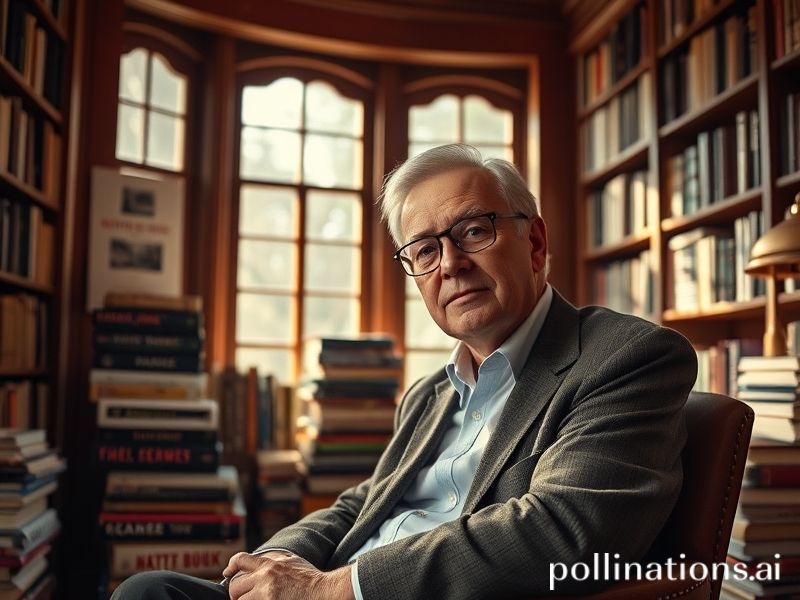How Richard Osman Became the World’s Favorite Arms Dealer—Of Cozy Murder Mysteries
Richard Osman: Britain’s Gentle Giant Now Exporting Polite Murder to the Rest of Us
By an Only-Vaguely-Grateful Correspondent Who’s Read Too Many Cozy Mystles
There was a moment, somewhere between the collapse of the Turkish lira and the discovery that even Antarctic penguins now have OnlyFans accounts, when the planet collectively decided what it really craved was genteel homicide in an English retirement village. Enter Richard Osman: 6 ft 7 in of amiable British bulk, once the quiz-show colossus who made obscure trivia feel like a warm biscuit, now the publishing phenomenon teaching the world that murder is most digestible when served with bone-china wit and a side order of digestive biscuits.
Globally, the timing is exquisite. While governments from Brasília to Budapest perfect the art of killing budgets, Osman has quietly franchised the more intimate, drawing-room variety. His Thursday Murder Club novels—translated into forty-plus languages, including, ominously, Russian—have sold north of ten million copies. That means more people currently own an Osman whodunit than own a functional power grid in parts of the Global South, a statistic that should depress absolutely everyone but somehow feels on-brand for 2024.
From Seoul’s metro carriages to Mexico City’s traffic-jammed microbuses, commuters are devouring tales of septuagenarian sleuths who dispatch villains using guile, Werther’s Originals, and the occasional well-aimed zimmer frame. It’s a soothing fantasy: the idea that age brings wisdom rather than Zoom fatigue, and that justice can be achieved without involving whoever happens to be president-for-life this week. In an era when real-life strongmen insist “I alone can fix it,” Osman’s geriatric posse offers the refreshingly subversive message that, actually, Joyce and her book-club cronies could probably run the world better between rounds of sherry.
Publishers, ever alert to a trend they can bleed dry, are now frantically commissioning their own national variants. France has “Le Club du Mardi Meurtrier,” because of course the French would schedule slaughter around lunch. Japan’s answer, “水曜の殺人サークル,” folds origami cranes into the forensics. Even the Finns—famously the happiest nation on Earth, which tells you everything about their baseline—are working on “Torstai Tappajat,” set in a lakeside sauna where the steam alone could suffocate a oligarch. Each version preserves Osman’s formula: small community, big heart, medium-sized body count. Cultural imperialism, but make it cozy.
The economic ripple effects are as absurd as they are predictable. British tourism boards now hawk “Osman Trails” around Kent, promising visitors the chance to stand precisely where a fictional pensioner brained an estate agent with a Thermos. Airbnb hosts in the actual village of Fairlight—population 1,800, suspiciously low crime—report bookings up 300%. Meanwhile, in a Los Angeles writers’ room, a panicked Netflix show-runner is pitching “Thursday Murder Club: Miami,” where retirees investigate murder between pickleball tournaments and ketamine infusions. Somewhere, the ghost of Agatha Christie is updating her LinkedIn.
And yet, beneath the whimsy lurks a darker observation: we appear to prefer our violence fictional, tidy, and morally uncomplicated. While cartels dismember journalists and drones redecorate wedding parties, we escape into a universe where every corpse comes with a charming backstory and a guaranteed resolution by page 320. It’s not escapism; it’s palliative care for the conscience. The planet burns, but at least Elizabeth, Ron, Joyce, and Ibrahim remembered to switch off the kettle before confronting the assassin.
Osman himself, affable to the point of parody, insists he’s merely “telling stories about friendship.” Sure, Richard. And the International Monetary Fund is merely telling stories about spreadsheets. The truth is simpler: in a fractured world, he’s managed to market nostalgia as geopolitical Prozac. We buy it wholesale because, frankly, the alternative is reading the news.
Conclusion? A tall man from Sussex has weaponised niceness into a soft-power triumph, proving that the final British empire will be built not on gunboats or oil rigs but on high-thread-count mysteries where nobody uses a mobile phone and the worst thing that can happen is running out of Battenberg. If that sounds absurd, remember we live on a planet where billionaires race to Mars because Earth is inconvenient. Compared with that, granny-led homicide feels almost rational. Pass the biscuits—assuming they’re not poisoned.







